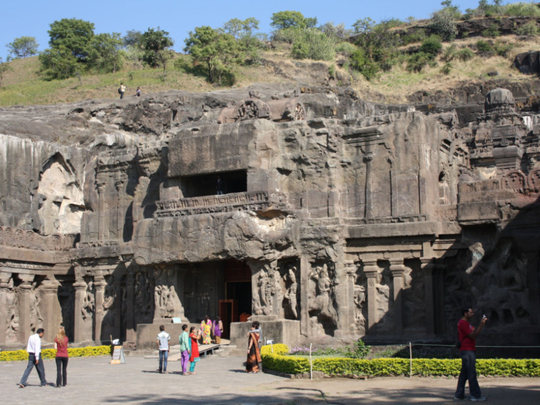
I dislike shopping. The charms of window displays are lost on me and discounts fail to get my blood pumping. The prospect of haggling, however, unnerves me. “How much did you pay for it?” and “Did you strike a bargain?” are questions I have dreaded since the time I was first tasked with grocery shopping back home in Goa. My answer sparks amusement, disappointment, and occasionally rage, depending upon the age of my interrogator. Sometimes I even get a ‘haggling for dummies’ tutorial.
A tour of the Ajanta and Ellora caves, world heritage sites in India, last month convinced me that haggling is an essential life skill one needs to master, especially when visiting India as a tourist. It serves as a potent weapon against the swarm of touts who descend on you, determined to play havoc with your holiday budget.
These touts were upon my wife and me the moment we stepped out of our car. One pressed a small quartz stone in my hand, saying it was a “gift”, and asking me to visit “shop number 60” on my way back. I gave a non-committal reply and moved on. Little did I expect him to be waiting when we returned four hours later! He led us to the shop in question where glasses of steaming, sweet tea were offered to us as we settled into a couple of chairs. Beautifully carved statues, candle and incense holders in stone, ranging from onyx to basalt, were displayed.
My wife was mesmerised, but a feeling of impending doom washed over me. Every time my wife is enthralled on a shopping trip, my bank balance pays the price.
So the stone works kept coming while my queries about their cost were dismissed with “Sir, let madam choose what she wants. We’ll discuss the price later!”
Turning deathly pale
Eventually, madam chose and it was the moment of truth. A calculator was fished out and after some number crunching I was quoted the princely sum of Rs12,500 (Dh725). I must have turned deathly pale because my wife decided that we should leave. This sent the shop-owner into a panic, and he pleaded that we quote our price. Little did he know that I was more embarrassed than horrified. You see, I did not have that much cash on me and they did not accept cards. Else I would have timidly paid!
Having no clue about the value of the items, I blurted out, “5,000 rupees!” since that was all the cash I had. I half expected to be assaulted, but the man stepped up his pleading, explaining how the products were painstakingly carved by poor villagers and were unique to the region and what not.
Thrilled by my foray into haggling, I argued ferociously — in Hindi no less — and 15 minutes later, emerged victorious.
We marched to our car with our bounty and, beaming with pride, I told our driver, a local boy, of my success. After listening patiently, he said: “Sir, these things are not worth more than 3,000 rupees.”
He was just upset that I got the better of his people, I tell you.
Perhaps I could be a mean player in this haggling business. I’ve already planned my next expedition: Buying fish in Goa. What’s the big deal, you may ask. Well, as any Goan will tell you, fish in the tiny state’s markets is sold by swarthy women with tongues as sharp as filleting knives and arms like clubs. Rub them the wrong way and you could join the fish on ice. For years I have chosen to be admonished by my exasperated mother rather than question the quality, or price, of the fish they sell.
I now intend to set the record straight. If I survive, it will make for an interesting story.












